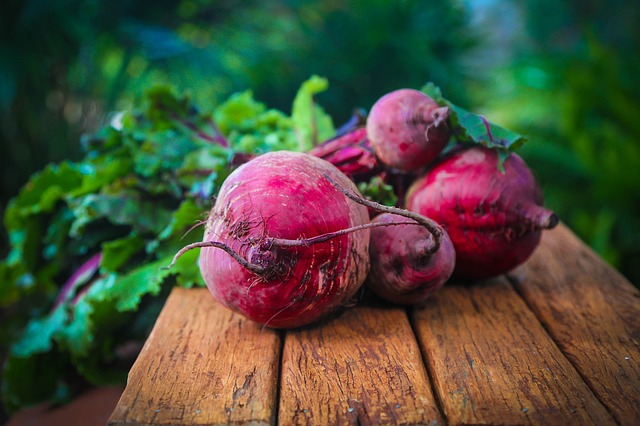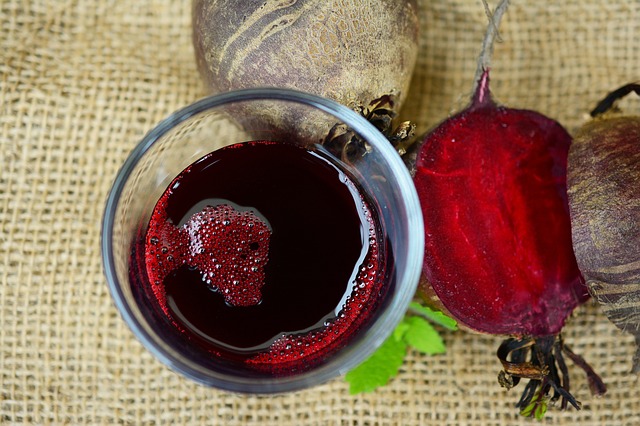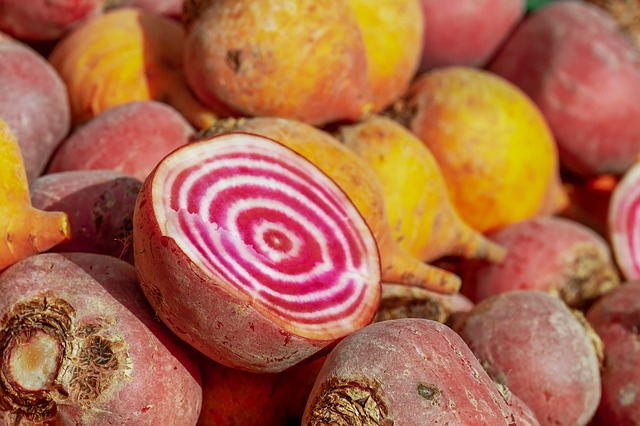
With all the emphasis on superfoods like dark leafy green vegetables and berries, the humble beet can easily be overlooked.
Don't be fooled, however, this root vegetable is a serious powerhouse of phytonutrients, vitamins and minerals and should be right up there on the superfood list.
It contains a group of antioxidants unique only to beets -- called betalains -- that have been shown to have numerous benefits for health associated with phytonutrients - anti-cancer and anti-inflammatory and more.
More so, beet juice is a very high source of naturally occurring nitrates, which carry their powerful life-promoting benefits. And we haven't even talked about the leaves of the beet yet, which provide us with their powerful assortment of health benefits similar to kale and spinach!
Juice the root and the leaves together and we have created one potent health drink!
Read on to learn more about these awesome benefits of drinking beetroot juice.
(Check out our bumper article about the 101 benefits of juicing).
It is believed that beet originated from the Mediterranean and Western parts of Asia.
Since the middle ages, beets have been used to treat numerous health conditions, especially those related to blood and digestion and even to counteract garlic breath.
In the 19th century, beet juice was commonly used to color wine.
110 grams of raw beets provides:
Detoxification is a process that happens in several phases and beet juice is especially helpful in the 2nd phase of this process.
In this second phase of detoxification, toxins are neutralized by a group of nutrients, making these toxins water soluble and safe for excretion.
The betalain pigments -- unique to beets -- have been shown repeatedly to powerfully support phase 2 detoxification as one of these toxin-neutralizing nutrients.

If detoxification is a key reason for your juicing plan then the cleansing health benefits of beet juice are going to be a key player.
Many of the phytonutrients in beets, some being unique to beets, have been shown to provide anti-inflammatory benefits. These anti-inflammatory effects are mostly attributed to vulgaxanthin, isobetain & betain, 3 of these powerhouse phytochemicals beets can call their own.
One of the ways that these phytonutrients reduce inflammation is through their innate ability to inhibit the activity of COX enzymes. COX enzymes are utilized by our cells to create messenger molecules that incite inflammation.
Atherosclerosis and type 2 diabetes are 2 life-threatening diseases that are associated with such inflammation.
In addition to their unique carotenoid and betalain phytonutrients, beets are also an unusual source of betaine; an essential nutrient made from choline (one of the B-complex vitamins).
Choline alone is an essential nutrient for fighting inflammation of the cardiovascular system because it helps prevent unwanted homocysteine build-up.
High homocysteine levels are connected with Atherosclerosis risk and other cardiovascular issues.
If you are looking to improve the quality and intensity of your exercise plans or athletic endurance then beet juice is not something you want to overlook!
Improving stamina during exercise is one of the more famous proven beet juice benefits and as such beet concentrates have made their way into numerous sports nutrition supplements.
One of the first studies that revealed this benefit was conducted at the University of Exeter's School of Sport and Health Sciences. This study gave 8 male cyclists 500 ml of beet juice (about 2 cups) -- providing almost 700 mg of naturally occurring nitrates found in beets -- over a period of 6 days.
The control group consumed a placebo drink, 500 ml of black cordial that contains minimal amounts of nitrates.
Over the 6 days, the cyclists performed various high-intensity and moderate-intensity cycling workouts. It was found that those consuming the beet juice were able to cycle for 16% longer! That's quite a significant difference.
So how do the nitrates in beet juice help with endurance? These nitrates (a.k.a nitric oxide) work by stimulating body functions that affect oxygen utilization. Blood vessels open up (vasodilation) to increase blood flow and provide more oxygen to the muscles, thus the muscles can work for longer.
While there are not yet true human studies on the anti-cancer properties of betalain (a prominent and unique phytonutrient in beets), laboratory studies with human tumor cells show betalains have strong anti-cancer abilities. Stomach, colon, lung, nerve, breast, testicular and prostate cells were all utilized in this study.
Like other phytonutrients, betalains combined antioxidant and anti-inflammatory benefits are believed to be the main factors that provide anti-cancer benefits.
Heart disease, including stroke, heart failure and heart attacks, is one the main causes of death worldwide. Not surprisingly, high blood pressure is one of the main contributors to heart disease risk.

Studies show that beets and beet juice can lower blood pressure significantly; remarkably by as much as 4-10 mmHg in just a few hours. Notably, this effect is greater for systolic blood pressure (when the heart contracts) than for diastolic blood pressure (when the heart is at rest).
The good news for us juicers, this benefit appears more pronounced for raw beets than cooked beets.
This blood pressure-reducing benefit is considered to be a result of the nitrate content of beets. Nitrates turn into nitric oxide in the body and nitric oxide helps blood vessels dilate.
Several of the health benefits of beet juice already mentioned -- increased physical stamina and lowering blood pressure -- are a result of the high nitrate content of beets. A greatly improved brain function is also another benefit of these nitrates.
Nitric oxide (made in the body from nitrates) dilates blood vessels and thus increases blood flow to our grey matter and thus could improve brain function. This is important as we age because the body's ability to make nitrates declines with age.
One of the most important things to point out when juicing beets is that the greens are equally as awesome as the root itself.
Just like other leafy greens -- collards, spinach and kale -- beet greens are loaded with phytonutrients, antioxidants, vitamins and minerals. So definitely juice those greens along with the root for one health-packed juice!
To prepare the beets simply top off the tail, cut off the greens, chop up the beets small enough to fit through the chute of the juicer your using, and then juice the greens, stems and beetroot. Enjoy!
Here are 5 beet juice recipes you can make at home for greater health and wellness.
Beet juice does have some sweetness to it and while some people like beet juice it's not to everyone's taste.
If you want to enjoy beet juice but the taste is not your favorite then mix it with some other fruits or vegetables that you know you like. Some good options include carrots, apples and pears.

This is as simple as it gets - just straight beet juice.
As we reveal in one of the health benefits of beetroot juice above, beet juice contains nitrates that can significantly boost our stamina during exercise.
Beets are not the only vegetable high in nitrates though.
So here we mix beets with a few other high-in-nitrates veggies for full exercising gains.
Sweet those beets with some tasty healthy fruits.
Beets are one of the most nutritious not-green vegetables, however, leafy green veggies are typically the most nutritious and antioxidant-packed of all fruits and veggies.
In this juice, we mix the best of beets and the awesome leafy greens. This juice is an unrivaled phytonutrient powerhouse.
Enjoy maximum cancer protection and major anti-inflammatory benefits.
Make your body's cleansing and detoxification pathways love you with this detoxifying and cleansing healthy beetroot juice recipe.
Most varieties of beets are dark red and are generally what we think of when we think of beets.
Beets can come in a range of colors, including white and golden varieties.

There are 13 main cultivars of beets, all red unless otherwise stated: